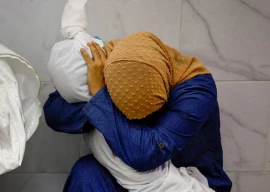
FAISALABAD/ ISLAMABAD:
Amidst increasing thaw in the frosty relations between Pakistan and India, the two neighbours confirmed on Monday that a new liberal visa regime came into immediate effect instead of the earlier agreed date of January 15, 2013.
The two countries had agreed to relax stringent visa rules in September this year when then Indian external affairs minister S M Krishna visited Islamabad. However, it was formally operationalised during Interior Minister Rehman Malik’s trip to New Delhi last week.
Confirming the move, Rehman Malik told a high-level meeting in Islamabad on Monday that the Pakistan government will create a focal point and convey the names of those who will monitor the progress to the Indian home ministry through the ministry of foreign affairs immediately.
The meeting decided that adequate bank facilities and counters will be set up at the Wagah-Attari border crossing for collecting visa application fees in either Indian or Pakistani rupee, according to an official statement.
In order to facilitate visitors from both sides of the border, offices of airlines, tour operators and bus companies will be established at railway stations along the border to provide them easy-to-access transport.
India confirms
India’s top diplomat in Pakistan also confirmed the move. Speaking at a Faisalabad Chamber of Commerce and Industry function, High Commissioner Sharat Sabharwal also spoke about improving trade relations between Pakistan and India.

He said trade and non-tariff barriers were being removed and substantial progress in trade relations was being achieved between the two countries.
“India will also reduce the ‘sensitive trade list’ to only 100 items within a year, while Pakistan will reduce it to 100 items within five years,” he reiterated. India maintained the “sensitive list” under South Asia Free Trade Area (SAFTA) agreement.
Sabharwal said Pakistan had not yet formally approved the “most-favoured nation” status to India.
In March 2012, Pakistan granted India the MFN status in an effort to normalise bilateral trade relations. New Delhi reciprocated in November, allowing foreign direct investment (FDI) from Pakistan in several sectors.
Energy issues
Regarding the pressing energy and gas crises in Pakistan, Sabharwal said India was going to have surplus electricity and gas for the next five years and would be more than willing to export it to Pakistan. He added that a gas pipeline already existed in India within 100 kilometres of the Pakistani border and could be easily extended to Pakistan as and when required.
Facilitating trade
Regarding trade between the South Asian neighbours, Sabharwal cited the example of a Pakistani fashion house set up in New Delhi which was successfully competing with local brands.
He added that infrastructure facilities have also been established on both sides of the Wagah border to facilitate cross-border trade.
Sabharwal stressed the need for confidence building measures to prevent anyone from displacing and derailing the peace process.
Published in The Express Tribune, December 18th, 2012.
COMMENTS (10)
Comments are moderated and generally will be posted if they are on-topic and not abusive.
For more information, please see our Comments FAQ



































































@Abrar Jan: agree with you - if hindu baniya returns it will be back to old india where hindus controlled the economy - even big industrialists today in Pakistan will not be able to face competetion from them - then there is also this problem of RAW people entering as business people or tourists
@Abrar Jan: I agree. The new visa regime should be scrapped.
Do not let Hindu terrorists roam Pak Street by Issuing Visas. People Like Hindu State Sponsored Active Duty Hindu Terrorist Col. Prohit and RAW trained Sarabjit Singh will be all over. Then Some day the Hindu International Terrorist Leader, Narendra Modi may join them as well. We do not want these Hindu Terrorists on this side of the Border. Stop this Visa liberalization.
@vasan:Kashmir issue is not a burning issue any more because it has already burnt Pakistan and the fire has been put off. This is the main problem/difference between Indians' and Pakistanis' thoughts that you don't consider Kashmir an issue but Pakistanis strongly and truly believe/consider Kashmir as issue to be resolvable on top priority basis as soon as possible....
"@realist:terrorists will be getting visas" If this is so and suppose you are rightful on your this stance then why did India sign visa's accord with Pakistan?Please hurry up and don't waste any more time so that no any terrorists couldn't get India's visas and cancel this visa's accord with Pakistan India signed....
Kashmir issue is not a burning issue any more because it has already burnt Pakistan and the fire has been put off @Clearly black bag.
When Kashmir issue shall be resolved?Because visa accord signed few days ago and has been applicable within one month but longstanding,burning and core Kashmir issue is 65 years old and any solutions regarding Kashmir have not been accepted and applicable yet except by giving these simple statements,id est,both governments emphasized on the continuation of peace talks to resolve Kashmir issue and Kashmir is the integral part of India.....
This is the best news I ever heard. Open trade and travel will bring prosperity to both Pakistan and India. The bext stage is joint ventures to produce goods and services at geographic locations that yeild the highest quality at the lowest cost. The drain on both economies by producing swords will be converted to a positive force by spending the money on ploughs. Thank you leaders of both countries.
terrorists will be getting visas